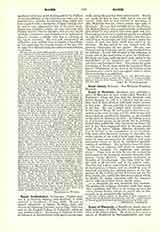

Roger of Hoveden, chronicler, was probably a native of Hoveden, or, as it is now called, Howden, in Yorkshire. From the fact that his chronicle ends rather abruptly in 1201 it is inferred that he must have died or been stricken with some mortal disease in that year. He was certainly a man of importance in his day. He was a king’s clerk (clericus regis) in the time of Henry II, and seems to have been attached to the court as early as 1173, while he was also despatched on confidential missions, as for example to the chiefs of Galloway in 1174. In 1189 he served as an itinerant justice in the north, but he probably retired from public life after the death of Henry II, and it has been suggested that he became parish priest of his native village, Howden, devoting the rest of his life to the compilation of his chronicle. Like most other historical writings of that date the earlier portion of his work is little more than a transcript of some one narrative to which he had more convenient access or which he considered specially worthy of confidence. His authority from 732 down to 1154 was an abstract, still extant in manuscript, “Historia Saxonum vel Anglorum post obitum Bed”. From 1154 to 1192 he uses his authorities much more freely, basing his narrative upon the well-known “Gesta Henrici”, commonly attributed to Benedict of Peterborough. But from 1192 to 1201 his work is all his own, and of the highest value. Hoveden had a great appreciation of the importance of documentary evidence, and we should be very ill informed regarding the political history of the last quarter of the twelfth century if it were not for the state papers, etc., which Hoveden inserts and of which, no doubt, his earlier connection with the chancery and its officials enabled him to obtain copies.
As a chronicler, he was impartial and accurate. His profoundly religious character made him somewhat credulous, but there is no reason, as even his editor, Bishop Stubbs, admits, to regard him on that account as an untrustworthy authority.
HERBERT THURSTON

